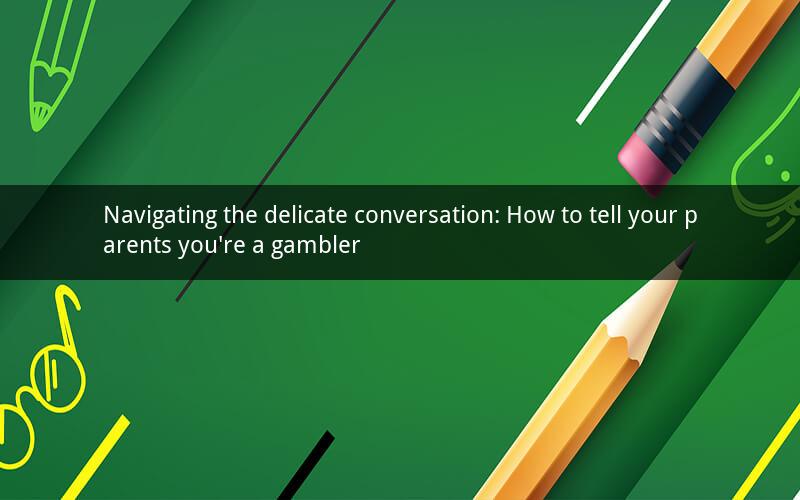
Introduction:
Dealing with gambling addiction is a challenging task, especially when it involves communicating your struggles to loved ones. Telling your parents that you are a gambler can be daunting, but it's a crucial step towards seeking help and support. This article aims to guide you through the process of how to tell your parents about your gambling problem, offering strategies and insights to make the conversation as smooth as possible.
Body:
1. Understanding the Importance of the Conversation
Before diving into the conversation, it's essential to recognize why discussing your gambling addiction with your parents is crucial. By sharing your struggles, you can seek their understanding, support, and guidance. It also opens the door for them to provide emotional support and help you find the necessary resources for recovery.
2. Preparing for the Conversation
To ensure a successful conversation, it's important to prepare yourself mentally and emotionally. Here are some tips to help you get ready:
a. Reflect on your gambling addiction: Understand the extent of your problem and its impact on your life, relationships, and responsibilities.
b. Gather information: Research treatment options, support groups, and counseling services available to you. This will help you present a plan for seeking help.
c. Choose the right time and place: Select a private and comfortable setting where you won't be interrupted or distracted.
3. Starting the Conversation
When you're ready to initiate the conversation, here are some steps to follow:
a. Express your concerns: Start by expressing your concerns about your gambling behavior and its consequences.
b. Use "I" statements: Instead of placing blame on your parents, use "I" statements to express your feelings and experiences. For example, "I feel overwhelmed by my gambling and it's causing problems in my life."
c. Be honest and transparent: Share the truth about your addiction, including the extent of your gambling and its impact on your life.
4. Addressing Concerns and Reactions
Your parents may have various concerns and reactions to your confession. Here's how to handle them:
a. Be prepared for emotional reactions: Your parents may experience anger, disappointment, or sadness. Allow them to express their emotions without judgment.
b. Acknowledge their concerns: Listen to their worries and address them calmly. Reassure them that you are committed to seeking help and making positive changes.
c. Focus on the positive: Emphasize your willingness to change and the steps you're taking to overcome your addiction. Highlight the support you're seeking from professionals and support groups.
5. Seeking Support and Resources
Encourage your parents to join you in seeking support and resources. Here are some options to consider:
a. Counseling: Recommend seeking individual or family counseling to address the addiction and its impact on relationships.
b. Support groups: Suggest joining a support group such as Gamblers Anonymous or a similar organization to connect with others facing similar challenges.
c. Treatment programs: Research treatment programs that specialize in gambling addiction and discuss the possibility of attending a residential or outpatient program.
Conclusion:
Telling your parents that you are a gambler is a significant step towards overcoming your addiction. By following these steps and addressing the concerns of your loved ones, you can create a supportive environment that aids in your recovery journey. Remember, seeking help is a strength, and your parents can be a valuable source of support and guidance.
Questions and Answers:
1. Q: How can I ensure that my parents won't be judgmental during the conversation?
A: Practice active listening and empathy. Show that you value their opinion and are open to their concerns. Be prepared to address their fears and reassure them of your commitment to change.
2. Q: What if my parents are skeptical about my addiction?
A: Provide specific examples of how your gambling has affected your life, such as financial difficulties, strained relationships, or missed responsibilities. Offer evidence of your efforts to seek help and recovery.
3. Q: Can I involve a professional during the conversation?
A: Yes, involving a professional counselor or therapist can be beneficial. They can guide the conversation, provide support to your parents, and offer guidance on how to address the addiction effectively.
4. Q: How can I ensure that my parents will continue to support me throughout the recovery process?
A: Maintain open communication with your parents and regularly update them on your progress. Encourage them to participate in family counseling or support groups to understand and support your recovery journey.
5. Q: What if my parents are unable to provide the necessary support?
A: Seek support from other sources, such as friends, extended family, or support groups. Remember, overcoming addiction is a personal journey, and seeking support from various sources can enhance your chances of recovery.